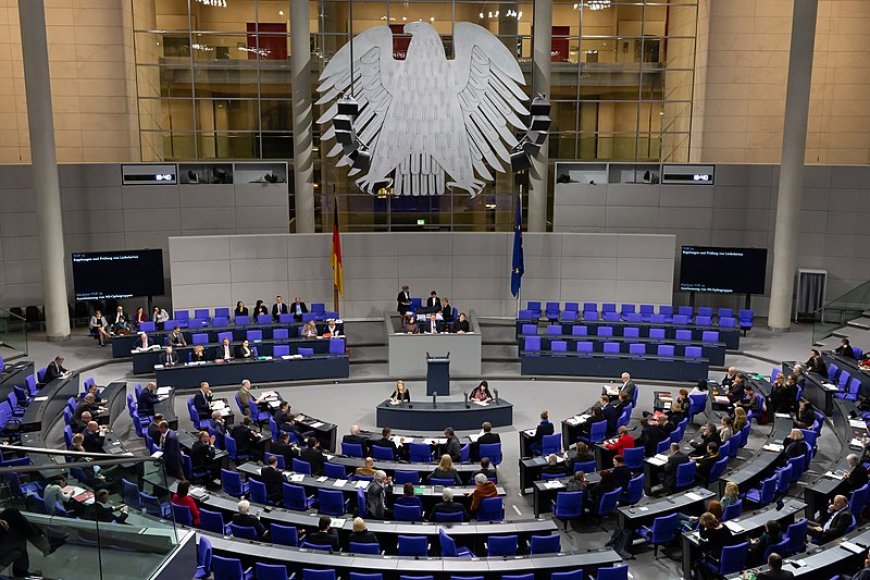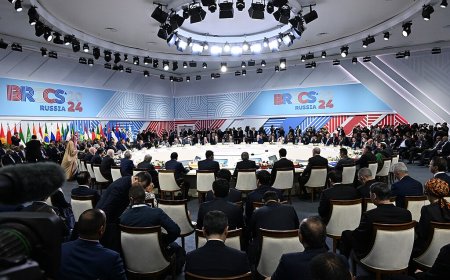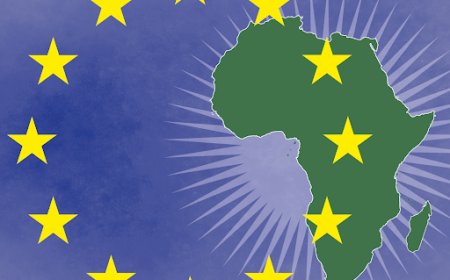This article is part of a series on “What is Germany’s Africa Policy?” The series is edited by Dr. Melanie Müller and Dr. Olumide Abimbola.
Summary
- Germany's new coalition government announced a "paradigm shift" on migration, signaling its ambitions to transform Germany into a modern immigration country. The new approach entails attracting more migrant workers to Germany and decelerating irregular migration.
- The recent appointment of a special representative for migration partnerships shows that cooperation with countries of origin of migrants is a cornerstone of the new German approach.
- But it is unclear what the paradigm shift entails for African partners. While Germany is open to negotiating visa facilitation agreements and legal pathways for specific groups of laborers, the government has made clear that migration partnerships will be a two-way street.
- The government wants to increase the number of returns – an area where African partners are often reluctant to cooperate. There is a high chance African partners will have to pick up the conversation on returns where the last German government left it. But there is also a risk of seeing legal pathways to Germany being connected to higher return numbers to Africa.
- Germany should define more clearly what its 'new' migration policy means for its partners. At the same time, African partners should also strengthen their positioning to capitalize on the small space opened by the new coalition.
Introduction
The new German government has big ambitions for its migration policy. The governing coalition announced a “paradigm shift” and the goal of transforming Germany into a modern immigration country. The objective is to expand, ease and increase possibilities for qualified workers to come, work and remain in Germany. To do so, the government intends to reduce bureaucratic hurdles and facilitate access to residency and citizenship, but also to build stronger partnerships with countries of origin of migrants. These aims are part of the mission of the newly appointed Special Commissioner for Migration Agreements, Joachim Stamp, a liberal politician from Germany’s largest state, North Rhein Westphalia. Many such partner countries are in Africa and include Ghana, Nigeria or Morocco. For them, this new paradigm may be a signal that the main topic of the migration conversation with Germany, previously dominated by the idea of curbing irregular migration from the continent, is changing.
On paper, there is little detail on what this paradigm shift entails for countries of origin of migrants, or which countries would be the primary targets of the new policy. As a result, the specifics hinge on political vision, which is hard to decipher given the broad spectrum of views represented within the coalition of Social Democrats, Greens and Liberals. But so far, political announcements show that little has changed. One example is the recently signed migration agreement with India, meant to serve as a template for future agreements, that sets out to facilitate mobility for qualified Indians while speeding returns for those required to leave Germany. Another example is the proposal of the Special Commissioner to process asylum applications in North African countries. To make the paradigm shift a reality, Germany should clarify what its ‘new’ migration policy means for African partners and what offer it is ready to make.
The paradigm shift: Labor needs drive the new migration agenda
In late 2022, German ministers presented a series of proposals to facilitate visas and ease access to naturalization and family reunification for skilled workers in an effort to boost labor migration from non-EU countries. The conservative opposition party, the CDU, opposes aspects of the reform that would ease regularization and naturalization processes but supports the objective of increasing the number of foreign workers in Germany. In fact, as a senior member of the previous governing coalition, the CDU enacted a law meant to simplify immigration procedures for skilled workers.
This surprising consensus on immigration stems from the needs of an aging society. According to the government’s own estimates, the German economy is in dire need of immigrants, about 400,000 of them per year, to fill labor shortages and maintain current growth levels. As the bulk of its labor migrants is also aging, Germany looks to diversify the source countries for its immigrant labor to those with a booming demographic, many of which are in Africa.
Next to a battery of legal changes in the pipelines, and the appointment of the Special Commissioner, the government is also re-purposing instruments originally set up with other intentions to serve its new objective of attracting migrants. One such example is the return centers operated by the German development agency (GIZ) in countries such as Nigeria, Tunisia, Ghana and Morocco. The original objective of those centers was to support returned migrants with reintegration and job-seeking in the country of origin, but officials of the Ministry of Cooperation interviewed for this report announced the intention to use these return centers as information centers on immigration to Germany for would-be labor migrants.
The new political impetus given to labor migration indicates a shift from the previous government’s focus, especially when it comes to the relationship with countries in Africa. Much of the previous government’s efforts in relation to migration in Africa were geared toward curbing irregular migration. In fact, ex-Chancellor Merkel’s late engagement in Africa in 2016 was concomitant with the German and European objective of reducing immigration levels. “Managing and shaping migration and tackling the causes of refugee movements” was one of the five objectives of Germany’s action in Africa, which translated into the funding of new initiatives to reduce irregular migration from Africa, tighten border controls and increase the number of returns to the continent (with the example of the return centers mentioned earlier).
This paradigm shift is, however, based on a familiar idea. Germany’s migration policy has long been dominated by economic imperatives and domestic labor needs, with the notorious example of the guest worker’s policy of the 1960s. In spite of this history and the new political push for labor migration, access to the labor market remains, in effect, complicated for third-country nationals. Requirements for skills recognition, proof of work experience and knowledge of German represent considerable obstacles to labor mobility and will only be slightly altered by the reforms set forward. Candidates for immigration from Africa tend to have fewer chances to see their visa application succeed than those from other world regions. They will have to count on additional bottlenecks at the embassies in countries such as Ghana and Nigeria, where Foreign Office officials say consular capacity to process visa applications are stretched. It remains to be seen how the government will correct these hurdles to opening up to African migrant workers.
A policy of give and take: Legal migration and returns work hand in hand
The promise of opening legal pathways has come with increased political pressure to accelerate the return of people required to leave Germany. The government argues that legal pathways and returns are the two faces of a balanced migration policy. Here too, the focus on returns is far from new. But the renewed priority given to returns with the so-called ‘return offensive’ is likely to hinder the willingness of German officials to open legal pathways for countries where cooperation on readmission is particularly difficult – notably countries in West and Central Africa. The rates of returns, the share of people with a return decision that are actually returned, from EU to African countries (save for Southern Africa) are not only the lowest compared to other world regions, but they have also decreased over the past 10 years to hover below the 20 percent mark. Unless cooperation on readmission improves, African partners are unlikely to see a drastic change in Germany’s immigration offer. There is a high chance that African countries will have to pick up the conversation on returns where the last German government left it.
Europeans have already tried to link the liberalization of legal pathways to better cooperation on returns with Africa. Negotiations on visa liberalization between the EU Commission and countries such as Morocco and Tunisia have been on hold for the past ten years precisely because of the Commission’s insistence on returns. European officials themselves recognize that conditionality is complex to negotiate as it puts great pressure on bilateral relations with partner countries. Importantly, this approach places the responsibility for low return rates solely on partner countries when much could be done domestically to improve return procedures and encourage countries to take their nationals back.
Reviving partnerships and old ideas
Germany’s new migration advisor caused a stir when he floated the idea of processing asylum applications outside Germany, eyeing countries in North Africa. Similar ideas made headlines in the past, such as that of disembarkation platforms for people intercepted in the Mediterranean Sea, or more recently, the attempt by the UK to send asylum seekers to Rwanda. Denmark recently halted its own negotiations on external asylum processing with Rwanda and turned to the EU for a joint solution.
The reason why the project of outsourcing asylum is resurfacing yet again is precisely because the proposal fails to convince partner countries to come on board. The idea of cooperating with countries of origin and transit of migrants in Africa originated in the early 2000s. Since then, Europeans have multiplied initiatives to increase the capacity of their southern neighbors to regulate migration flows, which intensified after 2015 and the creation of a dedicated European trust fund to tackle the “root causes of migration and displacement” in Africa. Germany was, for instance, among the most important contributors to the trust fund and the GIZ the first implementing organization to benefit from the funds. As part of these efforts, the GIZ funds several initiatives to bolster immigration regimes in different parts of Africa and reinforce state capacity to regulate and contain migration flows. Researchers view these measures as European efforts by Europeans to externalize migration control to key transit countries in Africa, for instance with the Better Migration Management project in Eastern Africa or the funding of Niger’s national migration strategy.
But things are not that simple. As a sponsor and partner of these initiatives, Germany knows too well the hurdles and gaps that exist in parts of the continent when it comes to immigration and asylum policy. African governments themselves are wary of loosening control over immigration or of making themselves too attractive to migrant workers or asylum seekers.
A new role in a changing world
The German government has made a point about its commitment to multilateralism, and this is clearly reflected in their approach to migration in Africa and at a global scale. At the first UN-sponsored review forum of the Global Compact on Migration in 2022, a global agreement on safe, regular and orderly migration, Germany hosted several events and roundtables showing a strong commitment to the discussions in comparison with other European partners. In Africa, the GIZ is a strong supporter of continental and regional organizations aiming to reduce hurdles to free mobility, such as the African Union (AU) and regional economic communities such as IGAD. As a result, Germany has become the first European partner of the AU on migration, investing in continental and regional free movement – and thus contrasting with other initiatives that seek to reduce mobility in western Africa.
Another notable shift in the German migration agenda is a thematic one. The German government has given new attention to the link between climate change and migration. The issue is now covered by several units in the Federal Foreign Office, which also funds new research initiatives on the topic such as the Platform on Disaster Displacement. However, there is a risk of this work becoming a ‘pet project’ of some ministries and not translating into other initiatives (e.g., projects led by the Ministry for Development Cooperation), especially as there is no coordinating body on migration across the different ministries.
Conclusion
The new German government announced a paradigm shift on migration with a renewed impetus on labor migration that hinges on new partnerships with countries in Africa and elsewhere. At this stage, it is hard to say what has changed for African migration partners. If anything, Germany is looking to build sustainable and reliable partnerships with countries with a skilled labor force and an acceptable level of cooperation on returns.
Several hurdles stand in the way of making these partnerships a reality. First, Germany is likely to condition opening pathways for immigration to better cooperation on returns, something African partners are reluctant to do. Second, current reform proposals will only slightly ease tough entry requirements to the German labor market, which will limit the scope of its partnerships with African countries and immigration possibilities for African nationals. Third, African partners may not be enthusiastic about the idea of sending skilled laborers to Germany. Brain drain, the exit of the highly skilled from the medical, engineering or IT sectors, remains a major concern for sending countries, especially in North Africa. A proposal for circular migration pathways for training and investment in critical infrastructure that would incite specialists to remain in Africa may garner more attention. Fourth, the German government has sent mixed signals about its intention to renew the partnership with Africa – the revival of an old proposal to externalize asylum processing being an illustration of the contradiction of the so-called new outlook on partnerships. This is a sign of the lack of clear political vision on the goals and means of the new migration policy.
Without political vision, there is a risk of the paradigm shift resulting in marginal changes and the re-purposing of familiar concepts. This may also override the programmatic work and research that Germany sponsors in different parts of the continent on topics of climate and migration, free regional movement and protection of migrants and refugees. This lack of clarity is problematic in a context where bilateral relations in regions such as the Sahel, central to the German and European African migration policy, are particularly difficult. In Europe and in Africa, security imperatives continue to dominate the conversation on migration. A serious proposal from the German government would build on the lessons learned from programmatic work in Africa to identify what works and what does not.
About the Authors
Dr Kwaku Arhin-Sam is the Executive Director of the Friedensau Institute for Evaluation (FIFE) and an Associate Fellow at the Arnold Bergstraesser Institute, Freiburg where he previously worked as a Research Fellow for the Political Economy of West African Migration Governance (WAMiG) project. He is an international migration researcher with a focus on sub-Saharan Africa and EU-Africa cooperation on migration. His research areas include migration governance and partnerships, diaspora and return migration and reintegration, identity and belonging politics. He holds a PhD from Jacobs University Bremen and the University of Bremen.
Alia Fakhry is a migration researcher and policy analyst. She regularly consults think tanks and international organizations on issues related to migration dynamics and policies in Europe, Northern Africa, Sahelian Africa and the western Mediterranean, as well as on EU-Africa cooperation on migration. She is affiliated to the German Council on Foreign Relations, where she coordinated the project “From Here to EU: How to Talk About Migration in Africa.”




